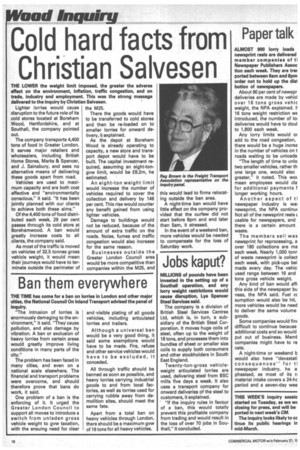Cold hard facts from Christian Saivesen
Page 12

If you've noticed an error in this article please click here to report it so we can fix it.
THE LOWER the weight limit imposed, the greater the adverse effect on the environment, inflation, traffic congestion, and on trade, industry and employment. This was the strong message delivered to the inquiry by Christian Salvesen.
Lighter lorries would cause disruption to the future role of its cold stores located at Boreham Wood, Hertfordshire, and at Southall, the company pointed out.
The company transports 4,400 tons of food in Greater London. It serves major retailers and wholesalers, including British Home Stores, Marks & Spencer, and J. Sainsbury, and sees no alternative means of delivering these goods apart from road.
Vehicles are used to maximum capacity and are both cost effective and "environmentally conscious," it said. "It has been jointly planned with our clients to achieve both these aims."
Of the 4,400 tons of food distributed each week, 29 per cent passes through its cold store at Borehamwood. A ban would greatly increase costs to all clients, the company said.
As most of the traffic is moved on vehicles of 32.5 tonnes gross vehicle weight, it would mean their journeys would have to terminate outside the perimeter of the M25.
There the goods would have to be transferred to cold stores and then be re-loaded on to smaller lorries for onward delivery, it explained.
As the depot at Boreham Wood is already operating to capacity, a new store and transport depot would have to be built. The capital investment required, assuming an eight-tongvw limit, would be £6.2m, he estimated.
An eight-ton weight limit would increase the number of vehicles required to cover the collection and delivery by 146 per cent. This rise would counter any benefit gained from using lighter vehicles.
Damage to buildings would not be reduced, because of the amount of extra traffic on the roads. Noise, fumes and traffic congestion would also increase for the same reason.
Businesses outside the Greater London Council area would be more competitive than companies within the M25, and this would lead to firms relocating outside the ban area.
A night-time ban would have little effect on the company provided that the curfew did not start before 8pm and end later than Sam, it stressed.
In the event of a weekend ban, more vehicles would be needed to compensate for the loss of Saturday work.


















































